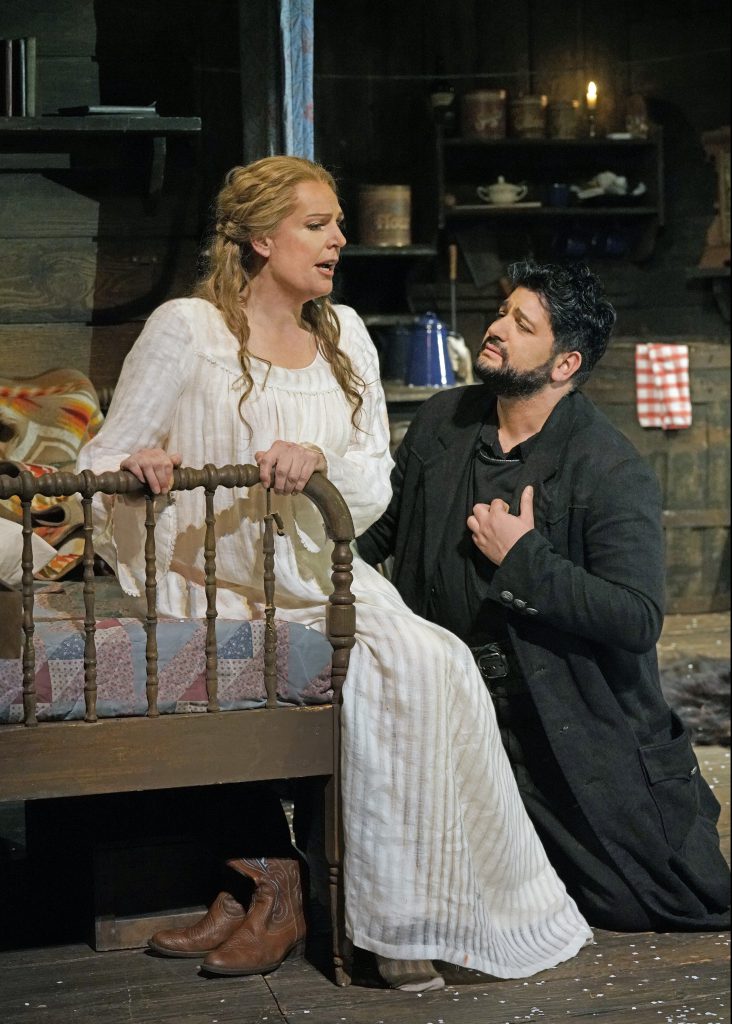Review Opera La Fanciulla Del West Met 2018

Eva-Maria Westbroek and Yusif Eyvazov in the Metropolitan Opera production of Puccini's "La fanciulla del W" Photo: Ken Howard
Puccini'south La fanciulla del Westward seems an odd slice on its confront, an operatic forerunner to the spaghetti Westerns of the silver screen, an Italian portrait of an American trope, sold back to Americans.
Yet in a compelling performance, such every bit the Metropolitan Opera gave in the season premiere on Thursday night, what'due south hitting is how little it leans on its romanticized setting. It'south the touching relationships of the characters, rather than the bar brawls, bandits, and horse chases, that brand the piece so effective.
Notwithstanding, Giancarlo del Monaco's 1991 production is about what you'd expect of an Italian opera set up in the Old West: an inexplicably huge sawdust-flooring saloon, a spacious cabin right at the pes of a mountain. Information technology is, at any rate, evocative: the desolate street of Human action III, with leaves and tumbleweeds blowing by, is a perfect setting for the high-stakes confrontations that finally resolve the plot.
Eva-Maria Westbroek was mostly successful in the title part, though information technology never felt like a perfect friction match. Minnie's particular combination of hard-nosed, gunslinging frontier woman and bright-eyed ingénue is a tricky balance to strike. Westbroek was most successful in the latter, convincing more as a young woman swept all of a sudden off her anxiety than as the carbine-toting hostess who breaks up a bar fight by putting a round in the ceiling.
There was a lot to commend Westbroek'south vocal performance—at her best, she found a focused intensity, especially in moments of urgent passion. Even so her dark-hued soprano on the whole sounded worn, growing alarmingly wide in sustained singing, and losing colour in her upper range. In Thursday'south performance she didn't seem to have the top of the part at all: she clipped many of her high notes to avert sitting on them while they strained.
Yusif Eyvazov, meanwhile, seems tailor-made for the part of Dick Johnson. His tenor is massive, powerful, and vivid—the sort of instrument that sounds like it should be hard to control, and yet he manages to corral information technology into tight, nuanced phrases, magnifying the impact when he sings at full voice. Combined with his earnest portrayal of a career bandit trying to reform himself, Eyvazov's performance was irresistible. "Ch'ella mi creda libero" was the knock-out aria that it ought to exist, an expansive, shining, impassioned climax to the emotional turmoil of the plot.
In that location were shades of Businesswoman Scarpia in Željko Lučić's imperious Jack Rance. A stage managing director warned before the first curtain that he was suffering from a cold, but you would hardly take detected it otherwise: apart from sounding a little smaller than usual, Lučić was in fine class, his uncannily smoothen baritone lending the crooked sheriff an extra dash of menace. At that place was a coldness to his reading of the office, equally he sought to guard his inner emotions in all but the most anxious of moments. The closest he came to an outburst was at the end of the tense poker scene, when he threw his cards down, snatched upward his lid, and dashed to the door with a curt "buona notte."
An impressive supporting cast filled out the mining town, kickoff with Michael Todd Simpson as Sonora, who brought a firm, robust baritone and sang with a slight weariness that lent some depth to the character. Carlo Bosi was amiable as the barkeep Nick, albeit with a rather wiry tenor. It'southward piece of cake for Jake Wallace'due south homesick lament in Act I to become comical, just in that location was an hostage sadness in Oren Gradus's rendition, delivered in a rich bass. Matthew Rose showed a wooly tone and gritty demeanor every bit Ashby, the Wells Fargo agent.
Kidon Choi stood out among the cameo roles with his rough-hewn baritone as José Castro, ane of Ramirez'south ring. Maryann McCormick lacked a depression vox but showed a nice, liquid middle as Wowkle, while Philip Cokorinos was a model character bass with a big, husky sound every bit Baton Jackrabbit.
Marco Armiliato led the Met Orchestra capably, if not imaginatively, keeping a adequately tight dramatic range for a score with such color and contrast, though he did manage to go on upwards a riveting tension in the second human action. The men of the Met chorus were at their very all-time—boisterous in their brawling, only melting in the warmth of their audio as they expressed their deep longings and fears.
La fanciulla del Due west runs through Oct 27 at the Metropolitan Opera. Jonas Kaufmann takes over the role of Dick Johnson starting Oct 17. metopera.org
Leave a Comment
Source: https://newyorkclassicalreview.com/2018/10/eyvazovs-heroic-performance-highlights-mets-la-fanciulla-del-west/
0 Response to "Review Opera La Fanciulla Del West Met 2018"
Post a Comment